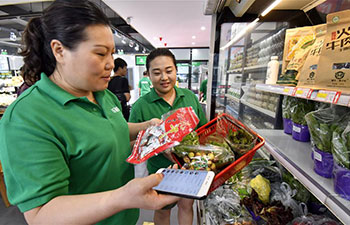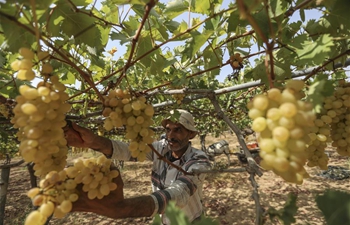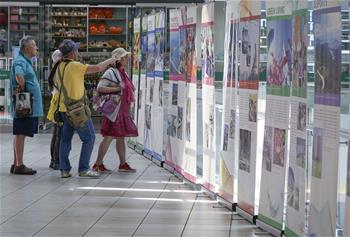ZHENGZHOU, July 26 (Xinhua) -- With a rapid expansion of business, Lu Guangli, founder of a food and beverage company in central China's Henan Province, was in trouble.
"As the number of franchises of my brand grew, it was hard to supervise them," said Lu, the founder of Ali Food and Drink, famous for its signature tomato-flavored soup noodles.
"Some stores were undermining the brand with inferior quality dishes that tasted inauthentic. It was also impossible to ensure that every individual kitchen complied with food safety regulations."
Lu's company, headquartered in Zhengzhou, capital of Henan, started to scale up its business in 2005, but it was not until 2013 that managerial inadequacies became particularly problematic as the company operated more than 100 stores nationwide.
But his problem was largely solved thanks to the "central kitchen" project launched by the province.
In 2014, Henan began the construction of a "central kitchen" industrial park in Yuanyang County. The project encouraged local food and beverage companies to build centralized workshops so they could provide chain stores with semi-finished food.
"The production of our tomato-flavored sauce has been industrialized," said Lu, whose company was among the first group of businesses to join the project. "The taste and safety of our products can be guaranteed."
In 2018, more than 30 food and beverage companies began to use the central kitchen and the project has been continually growing in scale. It is estimated that these companies now provide standardized products for more than one million Zhengzhou residents.
Zhang Cunyong, a researcher from Henan Food and Drug Supervision Administration, explained that the idea of the central kitchen was to deal with the problems facing the food and beverage industry as many companies tend to have chain stores but lack the ability to ensure uniform quality.
An e-commerce platform was also set up to standardize material storage and food delivery. The platform uses big data to analyze the demands of customers in order to help local farmers make their own development plans.
Some 50,000 hectares of standardized farms, and fields for poultry and cattle have been set up adjacent to the industrial complex.
According to Zhang Hailin, chairperson of the Henan Restaurant Association, the total sales of the food and beverage industry in Henan reached 270 billion yuan (40 billion U.S. dollars) in 2017. Fast food sales accounted for more than half of market share, which suggests the central kitchen could optimize delivery.
On the basis of the central kitchen, Yuanyang County also plans to develop agricultural and livestock breeding bases as well as tourism facilities featuring local food culture.

















